
Fishing is the activity of trying to catch fish, which are often caught as wildlife from the natural environment, but may also be caught from stocked bodies of water such as ponds, canals, park wetlands and reservoirs. Fishing techniques include trawling, longlining, jigging, hand-gathering, spearing, netting, angling, shooting and trapping, as well as more destructive and often illegal techniques such as electrocution, blasting and poisoning.
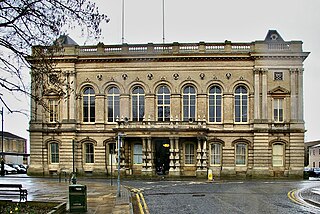
Grimsby or Great Grimsby is a port town and the administrative centre of North East Lincolnshire, Lincolnshire, England. Grimsby adjoins the town of Cleethorpes directly to the south-east forming a conurbation. Grimsby is 45 mi (72 km) north-east of Lincoln, 33 mi (53 km) south-south-east of Hull, 28 mi (45 km) south-east of Scunthorpe, 50 mi (80 km) east of Doncaster and 80 mi (130 km) south-east of Leeds. In 2021 it had a population of 86,138.

Trawling is an industrial method of fishing that involves pulling a fishing net through the water behind one or more boats. The net used for trawling is called a trawl. This principle requires netting bags which are towed through water to catch different species of fishes or sometimes targeted species. Trawls are often called towed gear or dragged gear.

A fishing trawler is a commercial fishing vessel designed to operate fishing trawls. Trawling is a method of fishing that involves actively dragging or pulling a trawl through the water behind one or more trawlers. Trawls are fishing nets that are pulled along the bottom of the sea or in midwater at a specified depth. A trawler may also operate two or more trawl nets simultaneously.
Havfisk is a Norwegian Whitefish fishing, seafood processing and sale company. The company was listed on the Oslo Stock Exchange and has its headquarters in Ålesund, Norway.
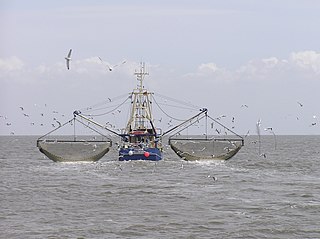
A fishing vessel is a boat or ship used to catch fish and other valuable nektonic aquatic animals in the sea, lake or river. Humans have used different kinds of surface vessels in commercial, artisanal and recreational fishing.
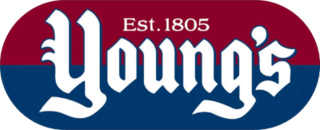
Young's Seafood Ltd. is a British producer and distributor of frozen, fresh, and chilled seafood, supplying approximately 40% of all the fish eaten in the United Kingdom every year. It is headquartered in Grimsby, England.
Carl Ross was a fishery entrepreneur and architect of the forerunner company to Young's Bluecrest, the UK's largest frozen fish producer.
Rinovia Steam Fishing Company Ltd. was a large fishing company operating from Grimsby, Lincolnshire, England. It specialized in deep-water fishing in the Icelandic grounds, and was responsible for handling Icelandic vessels landing their catch in Grimsby. It was also closely associated with the Icelandic consulate in Grimsby. Its trawlers bore a logo consisting of the fluttering flag of Iceland on their grey funnel.

A factory ship, also known as a fish processing vessel, is a large ocean-going vessel with extensive on-board facilities for processing and freezing caught fish or whales. Modern factory ships are automated and enlarged versions of the earlier whalers, and their use for fishing has grown dramatically. Some factory ships are equipped to serve as a mother ship.

The Royal Naval Patrol Service (RNPS) was a branch of the Royal Navy active during both the First and Second World Wars. The RNPS operated many small auxiliary vessels such as naval trawlers for anti-submarine and minesweeping operations to protect coastal Britain and convoys.

Fishing is a prehistoric practice dating back at least 70,000 years. Since the 16th century, fishing vessels have been able to cross oceans in pursuit of fish, and since the 19th century it has been possible to use larger vessels and in some cases process the fish on board. Fish are normally caught in the wild. Techniques for catching fish include hand gathering, spearing, netting, angling and trapping.

The coastline of the Russian Federation is the fourth longest in the world after the coastlines of Canada, Greenland, and Indonesia. The Russian fishing industry has an exclusive economic zone (EEZ) of 7.6 million km2 including access to twelve seas in three oceans, together with the landlocked Caspian Sea and more than two million rivers.

Mincarlo is the last surviving sidewinder fishing trawler of the Lowestoft fishing fleet. She is also the last surviving fishing vessel built in Lowestoft, with an engine made in the town.
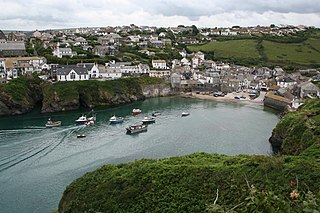
The fishing industry in England comprises a significant proportion of the UK's fishing industry. England retains a large but reduced fishing industry. Its fleets bring home fish of every kind, ranging from sole to herring.

Koraaga was a Castle-class steel-hulled trawler built in 1914 by Smith's Dock Company, South Bank, Middlesbrough. She was requisitioned as an auxiliary minesweeper operated by the Royal Australian Navy (RAN) in October 1917 for minesweeping duties during World War I, but she was never commissioned. Koraaga returned to be operated commercially as a fishing trawler until she wrecked when she struck a reef off Bass Point whilst carrying returning to Sydney. She was refloated on the tide after having becoming stranded and drifted till she was finally lost five miles (8.0 km) east of Black Head, Gerringong on 10 September 1931.
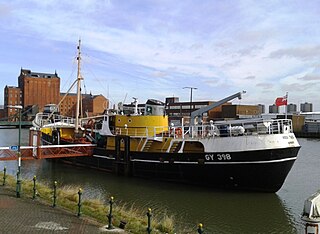
Ross Tiger is a traditional side-winder fishing trawler that was converted into a museum ship in 1992. She is currently berthed in Alexandra Dock at her home port of Grimsby, close to the site of the former PS Lincoln Castle. She forms the star attraction of North East Lincolnshire County Council's National Fishing Heritage Centre since restored and opened to the public in 1992. As Grimsby's last traditional sidewinder 'conventional trawler', she represents a now virtually extinct breed of vessels that once made up the largest fishing fleet in the world.

Excelsior is an authentically restored fishing smack of the Lowestoft fishing fleet and a member of the National Historic Fleet. She was built by John Chambers of Lowestoft in 1921 and worked until 1936 before being converted into a motor coaster.

Frosta AG is a frozen food company headquartered in Bremerhaven, Bremen, Germany. The corporation owns production facilities in Germany and Poland, with sales and distribution subsidiaries in the Czech Republic, Germany, Hungary, Italy, Poland and Romania. It had 1709 employees and revenues of Euro 501 million in 2017. FRoSTA is the market leader for frozen food in Germany and one of the largest in Europe.


















